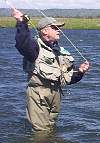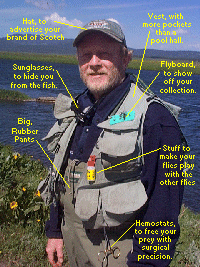|
 Friday, June 25, 1999, Henry's Fork, on the Snake River, Island Park, Idaho -
"Your fishermen break down into two groups, Mark; bait and non-bait," says Dave Smith, who casts his line as a proud member of the second group, for he is a "dry-hook" fly fisherman. Smith wouldn't directly say his choice in tackle makes him superior to other fishermen - at least not directly - but he refers to the opening quote from the book "A River Runs Through It."
Friday, June 25, 1999, Henry's Fork, on the Snake River, Island Park, Idaho -
"Your fishermen break down into two groups, Mark; bait and non-bait," says Dave Smith, who casts his line as a proud member of the second group, for he is a "dry-hook" fly fisherman. Smith wouldn't directly say his choice in tackle makes him superior to other fishermen - at least not directly - but he refers to the opening quote from the book "A River Runs Through It."
"In our family, there was no clear line between religion and fly-fishing... My father was a Presbyterian minister and a fly fisherman... He told us about Christ's desciples being fishermen, and we were left to assume... that all first-class fishermen on the Sea of Galilee were fly fishermen, and that John - the favorite - was a dry-fly fisherman."
Smith's indoctrination into this elite class came about several years ago, as he stood in Oregon's Metalius River and pulled a rainbow trout off his hook. Up until that one catch, he had been an average fisherman, using whatever bait would lure the beast onto his hook, so he could pull that evening's dinner from the rushing waters.
"That event changed my life," he says. Somehow, he was blessed with the inspiration to climb up to what is perhaps the purest form of sport hunting; to lure a prey and capture it using simple devices and finesse. "I no longer consider myself the center of the universe," he says. He didn't mention if walking on water was a part of that day.
Smith has been fishing on Henry's Fork every year for eight years, abandoning his job as a Portland, Oregon lawyer for a week or so, taking a few rooms at the A Bar and spending day after day watching the river flow past. He agrees with claims that this is hallowed ground for fly fishing - possibly the finest in the world - due to the abundance of trophy fish, the varying conditions along the river, and a dam, which controls the level and flow.
 Part of the thrill of being a "dry-hook" fisherman comes visually. Most fishermen will know they have a strike when they feel a tug on their line, but, since your fly is floating on the surface, you will be able to see the fish make the wrong move. You will be both participant and spectator the instant that fish makes the clear statement that you are indeed, smarter than he is.
Part of the thrill of being a "dry-hook" fisherman comes visually. Most fishermen will know they have a strike when they feel a tug on their line, but, since your fly is floating on the surface, you will be able to see the fish make the wrong move. You will be both participant and spectator the instant that fish makes the clear statement that you are indeed, smarter than he is.
"There's something about catching a fish that creates a nexus between you and the fish," Smith says. He must feel that, when he casts his line and fly, he is only doing so, because he cannot be that fly. That is apparently his real goal; to be a fly, and he seeks that goal with only mock chagrin. So Smith will watch the flies dance on the water, and will concentrate on the mayfly, the one most coveted by the fish he is after, and he will notice which stage they are in. He will attach the appropriate fly to his line, and then cast it among them. He will cast and pull back, cast and pull back, repeatedly, for hours, if necessary. He will not merely cast the line, but will "unroll it like a carpet." He will send that fly above the trout with such grace, that, if it is eaten, the flies all around will feel genuine sorrow for the loss of what even they believe to be a loved one.
 The object of their ambition; the mayfly.
The object of their ambition; the mayfly.
|
Smith studies the mayfly - the most popular fly which grown fishermen who imitate flies, imitate. He knows every stage and characteristic of the insect's short life; he knows when, where and how they are born, how they molt, reproduce and die. He knows how they fly and how they light. He knows the mayfly because the mayfly is his friend, his associate, his teammate. The mayfly buzzes about the air and lights on the water by the thousands. It naively trains the trout and other fish to rise to the surface and end the poor fly's life. Smith attaches himself emotionally to no single mayfly, as the being lives only a day or so, but he knows that each one behaves exactly the same, and he also wants to behave the same.
|
People fish
for 3 reasons:
Work: If the main reason you fish is to sell or eat them, then it is work, and you don't enjoy it until you eat it or spend it.
Play: If the only enjoyment you get out of fishing is the thrill of reeling in a big one, then you will do anything, and use any bait, lure, chemical or electrical device to get their mouths clamped onto your hook.
Spiritual: If you have no desire to sell or eat the fish you catch, if you feel a sense of climax when you get a strike, then you will bring the fish in merely to get it off your hook and back in the water. "A fly fisherman fishes for many years, before he realizes that it's not the fish he's after," says Smith.
|
"Mayflies are beautiful creatures," Smith says as he pulls out a small net and captures a few of the subjects. "They're so tiny, they have such intricate detail, and they come in different sizes." He says the first stage of their lives is only three or four hours long, and then they molt. "They shed their skin, their wings pop out, and they float until the wings work," he says, with unreasonable fascination. "It all only takes a few minutes." He notes that this is the point in their lives when, should the fly be eaten by a fish, he will be gulped down quickly. Pay attention, this is important.
The fly then molts, and in 24 hours, it will mate, Smith tells me, and then reproduce. "When they lay eggs, they are called a spinner," he says, adding that, at this point, if the fly is eaten, he is gently sipped.
Too much information? Why would you want to know this? Because you may wish to imitate a mayfly someday, and before you do this, you should decide if you want to be gulped or sipped, and you will act accordingly, perhaps lingering on the surface longer, or flitting away teasingly, only to return seconds later. This is truly a deep and introspective artform, my friends.
This whole process of fish eating insects was long thought to be simply a part of the food chain, but fly fishermen know better. They know that flies dot the surface of waters and behave like flies, so that fish will be compelled to rise to the surface and take hold of them, or anything which looks and acts just like them. And they know that the fish do this so the fly fishermen will have a purpose in their lives, which will be to gracefully and perfectly imitate that fly.
Imitating a fly successfully is only part of the challenge. According to Smith, when the fish "rises to the fly" the action begins. You must "set the hook" in the fish's mouth, which is not easy if you (like Smith) use a barbless hook. Then, if you are using a very lightweight line, you "play the fish" to tire it a little, and you carefully pull it in. Then you remove the hook, and toss the little player back in the game. If you tire the fish too much, it will die when you release it. Smith has caught the same fish two or three times in the same day, which is harder to do when it's dead.
Fly fishing is a good equalizer, since it is an activity which requires a much greater reliance on technique than on equipment. It is possible to spend thousands of dollars on a rod, reel, line, flies, clothing and accessories, but it is also possible to spend a hundred dollars and have the same results. You don't need an expensive boat - you don't even need a boat. A good cigar and malt scotch help a little, but only in recanting how you outwitted the magnificent fish. All you do need is patience, an appreciation for the beautiful rivers and streams where this activity takes you, and, to be a very good dry-fly fisherman, you can't just nibble at the sport, you have got to get hooked on it.

Dave Smith shows us some of the essentials
to being a good fly fisherman.
|

